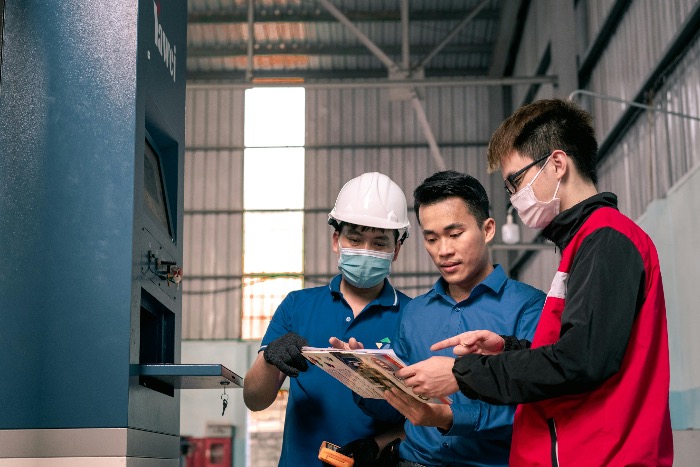Interning in Japan: What Japanese Companies Look For in International Interns
International internships in Japan can be an eye-opening bridge between cultures. As Japanese companies become more global, they are increasingly open to bringing on international interns, but they also have clear expectations. In fact, the number of Japanese workplaces employing at least one foreign worker reached an all-time high of around 342,000 in 2024, a 7.3% increase from the year before.
These employers place great importance on how well you can fit into the team and adapt to Japanese work culture, alongside the concrete skills you bring to the table. In other words, success as an intern in Japan requires a balance of the right attitude and relevant abilities.
This post explores the key qualities that Japanese companies tend to look for in their foreign interns, broken down into soft skills and hard skills. By understanding these, you can better prepare to meet (and exceed) your host company’s expectations!
Soft Skills: The Personal Traits that Matter
Soft skills, your personal attributes and how you interact in the workplace, are often a major focus for Japanese companies when evaluating interns. In fact, one survey from the end of 2023, conducted among hundreds of Japanese firms, found that communication skills were the number-one quality they seek in foreign hires, with teamwork (cooperative ability) close behind.
This reflects Japan’s well-known emphasis on group harmony and effective communication.
Communication Skills
Being an effective communicator is vital in any internship, and it’s especially emphasized in Japan; this means clearly expressing your ideas or concerns and being an attentive listener. If you don’t speak much Japanese, you should still aim to communicate clearly in English (the working language at some global companies) and learn basic Japanese greetings or phrases for courtesy.
Beyond language, you’ll need to navigate Japan’s indirect and high-context communication style; for example, people may not always say “no” outright to avoid offense. Observing non-verbal cues and “reading the air” (as the Japanese say) will help you adjust. By being polite, clear, and perceptive, you demonstrate respect for the workplace culture and ensure nothing gets lost in translation.
Adaptability
Japanese internships often require flexibility and a willingness to adjust to new ways of working. As a foreign intern in Japan, you may encounter differences in workflow, decision-making pace, or even daily routines. Showing that you can adapt quickly to these changes and are eager to learn new ways of doing things is crucial.
For instance, Japanese companies value punctuality and process; an intern who adjusts to this mindset will fit in much better. Similarly, you might be asked to rotate through various tasks (even those outside your original role) or handle unexpected projects; embracing those challenges with a positive attitude will impress your supervisors. In short, flexibility and resilience in the face of new experiences will mark you as a capable intern who can handle the international transition.
Teamwork and Cooperation
Team-oriented work is at the heart of Japanese business culture. Interns are expected to be good team players who prioritize the group’s goals, and in Japanese workplaces, success is seen as a collective effort. You should demonstrate that you can collaborate, support your colleagues, and contribute to a harmonious work environment.
This might mean double-checking that your teammates have what they need, volunteering to help on group tasks, and being sensitive to group consensus. Proactively cooperating and showing awareness of others’ needs will signal that you understand the importance of wa (harmony); one reason “cooperative skills” ranked among the very top traits Japanese employers seek.

Humility and Willingness to Learn
Humility is highly valued in Japan. For interns, this means approaching tasks with modesty, no matter your past achievements, and showing eagerness to learn. Companies appreciate interns who are confident yet humble, willing to ask questions and accept guidance without defensiveness. Avoid coming across as a “know-it-all;” emphasize that you’re there to absorb knowledge and improve (that's what internships are for anyways!).
Accept feedback and show appreciation when teammates share their knowledge. Be mindful of hierarchy by respecting senior staff and acknowledging their experience. This openness shows you understand the cultural expectation of learning and helps build stronger relationships. A humble attitude, paired with enthusiasm, will make you stand out as an adaptable and trusted intern.
Cross-Cultural Awareness
Maybe an obvious one but being culturally aware goes a long way toward success in a Japanese internship. This means educating yourself about Japanese customs, business etiquette, and social norms, then applying that knowledge daily. Simple things, like using polite forms of address, bowing or exchanging business cards properly, and following office protocols, shows your respect for the local culture.
By showing you appreciate and respect the Japanese way of doing things, you build trust. It’s equally important to remain open-minded and approach differences as learning opportunities. Japanese colleagues will notice your effort to fit in and understand their culture, which can greatly improve your working relationships. Remember that thriving as a foreign intern in Japan it’s also about how well you can integrate into a different environment.
International interns in Japan who cultivate these soft skills will find that they can easily overcome the common challenges of adjusting to Japan’s work culture. And by developing these qualities, you not only meet Japanese employers’ expectations, but you also set yourself up for growth in any global workplace!

Hard Skills: The Technical Abilities and Knowledge Bases
While attitude and character are crucial, Japanese companies also look for interns who bring some tangible skills or knowledge to the role. In fact, according to the same survey mentioned earlier, the main reason Japanese companies hire foreigners is to “secure excellent talent.”
In general, you won’t be expected to be an expert, internships are for learning, after all, but showing competency in a few core areas will make you a much more attractive candidate!
Digital Literacy
Being comfortable with technology and digital tools is essentially a baseline requirement everywhere now. Most Japanese offices are highly digitalized and efficient, so an intern who is proficient with computers will integrate faster. Digital literacy includes knowing your way around common software and online platforms; for example, using office productivity software (word processors, spreadsheets, presentation tools) or communication apps with ease. If you can quickly learn any new internal software the company uses, that’s even better.
Research and Information Gathering
Many internships involve doing background research, benchmarking industry trends, or compiling information to support projects. Having solid research skills means you know how to identify reliable sources, collect data, and synthesize findings effectively.
Japanese companies appreciate interns who can dig into a problem and come back with insights or options. For example, you might be asked to research a potential overseas market or to summarize what competitors are doing. If you can approach such tasks systematically, by using online databases, academic papers, or even bilingual sources if you have the language ability, it shows initiative and intellectual curiosity.
Being resourceful in finding answers shows that you can take ownership of a task. In Japan’s often detail-oriented business environment, thorough research and careful fact-checking are highly valued.

Basic Industry Knowledge
Apart from general skills, companies expect that you have some knowledge relevant to the field or department of your internship. This doesn’t mean you need years of experience, but you should understand the fundamental concepts and terminology of the industry you’re entering.
For instance, if you’re going into a marketing internship, you should be familiar with terms like SEO, branding, or market segmentation. Japanese employers often assume that a student’s university coursework or personal projects have given them a theoretical foundation, and they’ll be looking for you to apply that foundation in a practical setting. Essentially, do your homework about the field, it will pay off during your interviews and once you start the internship!
Language Skills and Multilingual Ability
Being multilingual is a valuable asset in many Japanese workplaces, especially if you can use both English and Japanese. While not all internships require fluency, even basic Japanese can make daily tasks easier and help you integrate into the team. Companies with an international focus may operate bilingually, but if you’re dealing with Japanese clients or teams less used to English, stronger Japanese ability will be expected.
Fluency in other languages (Korean, Chinese, Spanish, French, etc.) can also set you apart in fields like hospitality, tourism, translation, PR, or global business. As Japanese companies engage more internationally, interns who can bridge language gaps are seen as bringing both communication skills and cultural adaptability.

Examples of Industry-Specific Preferences
While the above qualities are valued in virtually all fields, different industries may have their own emphasis or additional expectations. Here’s a brief look at what certain sectors might prioritize:
💻 Tech and Engineering
In Japan’s tech sector, there is a strong demand for technical proficiency and problem-solving skills, alongside soft skills. Companies value interns who bring fresh ideas or specialized knowledge in areas like programming, AI, or engineering. In fact, nearly 40% of firms hiring foreign STEM students said they seek specialized expertise; curiosity and a continuous improvement mindset (the famous kaizen) are also highly regarded.
At the same time, teamwork is crucial even in technical roles. Japanese tech teams often make decisions collectively, so being able to discuss solutions collaboratively is key. In other words, an ideal tech intern in Japan is a curious problem-solver who’s also a cooperative team player. Bilingual ability (Japanese-English) is a strong bonus, since many IT firms work with global clients and value interns who can switch languages with ease.

🏯 Tourism and Hospitality
The hospitality, travel, and service industries in Japan put a spotlight on customer service and cultural awareness. Here, the concept of omotenashi: providing wholehearted hospitality and anticipating guests’ needs, is the gold standard. Interns in hotels, tourism offices, or travel companies will be expected to be attentive, courteous, and proactive in helping customers.
Multilingual skills are highly valued since you may be dealing with international tourists. Being able to speak English plus some Japanese (or other languages like Chinese or Korean) can be a major asset in this sector. Essentially, a successful intern in tourism/hospitality combines language ability with a service-oriented mindset, embodying the Japanese hospitality ethic of treating customers with warmth and respect.

🏭 Manufacturing
In Japan’s manufacturing sector or engineering firms, there is often a strong focus on precision, discipline, and technical know-how. Interns in these environments might be expected to follow established procedures meticulously and show high attention to detail, reflecting Japan’s famous commitment to quality.
At the same time, teamwork is just as important on a factory floor or in a lab: being able to coordinate with your team and maintain harmony can affect safety and efficiency. Companies in these fields also value interns who are genki (energetic) and have stamina, as some manufacturing internships can involve long hours or physical work.
Of course, every company is unique. A trendy startup might be more relaxed about hierarchy, while a large corporation might be more formal. But the examples above capture general trends in what different sectors appreciate.

Bringing It All Together

Japanese companies considering international interns are essentially looking for well-rounded candidates. They want to see that you possess the soft skills to integrate into a Japanese team, but also the practical abilities that let you contribute independently. An ideal intern shows strength in both.
Remember, your internship is as much a learning opportunity as it is a job. Japanese colleagues and supervisors understand you’re adapting to a new environment, and if you show curiosity, cultural sensitivity, and initiative, most will be supportive and eager to guide you. By the end, you’ll have gained professional skills while showing that you embody the qualities they value. That impression can open doors to future opportunities in Japan or anywhere around the world!
🦾 Ready to put your skills into practice in Japan?
Japanese companies are looking for interns who bring curiosity, adaptability, and a willingness to grow. If you’re excited to challenge yourself in this environment, join our internship program or reach out to us today; we’ll help match you with the opportunity that fits your goals!







